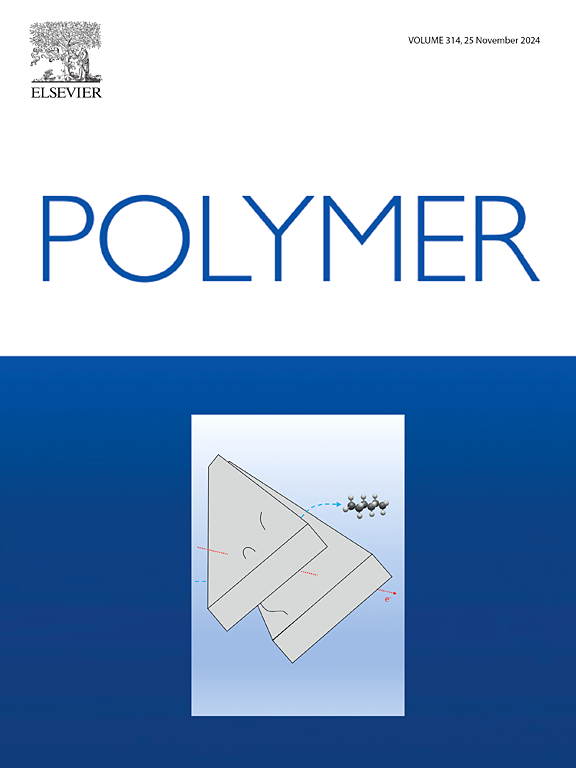Synthesis and photopolymerization kinetics of acrylate-terminated polyether for additive manufacturing
IF 4.1
2区 化学
Q2 POLYMER SCIENCE
引用次数: 0
Abstract
The development of photocuring 3D printed solid propellants is limited by photosensitive binders. Numerous commercial photosensitive oligomers used as binders for solid propellants fail to meet the performance criteria related to processability, mechanical properties, and safety. Modifying established binders that have been used in solid propellants offers a more cost-effective and dependable approach to prepare photosensitive binders. By utilizing the addition reaction between the isocyanate group in 2-isocyanatoethyl acrylate (AOI) and the hydroxyl group in hydroxyl-terminated polyether (HTPE), we successfully modified HTPE to synthesize acrylate-terminated polyether (ATPE), which exhibits the capability of undergoing free radical polymerization. The molecular weight distribution of HTPE and ATPE, as well as the correlated characteristic absorption peaks, were analyzed using gel permeation chromatography (GPC) and Fourier transform infrared spectroscopy (FTIR) techniques, respectively. The excellent initiation properties of photoinitiator 819, serving as a photosensitive additive of ATPE, were elucidated by comparing the differences in molar absorption coefficients, initiator decomposition rates, and initiator decomposition rate constants among photoinitiators 184, 819, TPO and TPO-L under UV light at 405 nm. The thermal effects resulting from the photopolymerization of ATPE were investigated using photo differential scanning calorimetry (Photo-DSC), and the characteristics of the photopolymerization reaction, along with polymerization kinetic parameters such as the polymerization rate, growth polymerization rate constant (kp), and termination polymerization rate constant (kt), were analyzed in detail. The synthesis and photopolymerization kinetics of ATPE presented in this work provide valuable support for the photopolymerization 3D printing of solid propellants.


丙烯酸酯端聚醚的合成及增材制造光聚合动力学
光固化3D打印固体推进剂的发展受到光敏粘合剂的限制。许多用作固体推进剂粘合剂的商用光敏低聚物不能满足与可加工性、机械性能和安全性相关的性能标准。对固体推进剂中已建立的粘合剂进行改性,为制备光敏粘合剂提供了一种更具成本效益和可靠性的方法。利用2-异氰酸乙酯(AOI)中的异氰酸酯基团与端羟基聚醚(HTPE)中的羟基之间的加成反应,成功地对HTPE进行了改性,合成了端羟基聚醚(ATPE),该聚醚具有自由基聚合的能力。利用凝胶渗透色谱(GPC)和傅里叶红外光谱(FTIR)技术分别分析了HTPE和ATPE的分子量分布以及相关的特征吸收峰。通过比较光引发剂184、819、TPO和TPO- l在405 nm紫外光下的摩尔吸收系数、引发剂分解速率和引发剂分解速率常数的差异,阐明了作为ATPE光敏添加剂的光引发剂819优异的引发性能。采用光差扫描量热法(photo - dsc)研究了ATPE光聚合的热效应,并详细分析了光聚合反应的特征以及聚合速率、生长聚合速率常数(kp)和终止聚合速率常数(kt)等聚合动力学参数。本文研究的ATPE的合成和光聚合动力学为固体推进剂的光聚合3D打印提供了有价值的支持。
本文章由计算机程序翻译,如有差异,请以英文原文为准。
求助全文
约1分钟内获得全文
求助全文
来源期刊

Polymer
化学-高分子科学
CiteScore
7.90
自引率
8.70%
发文量
959
审稿时长
32 days
期刊介绍:
Polymer is an interdisciplinary journal dedicated to publishing innovative and significant advances in Polymer Physics, Chemistry and Technology. We welcome submissions on polymer hybrids, nanocomposites, characterisation and self-assembly. Polymer also publishes work on the technological application of polymers in energy and optoelectronics.
The main scope is covered but not limited to the following core areas:
Polymer Materials
Nanocomposites and hybrid nanomaterials
Polymer blends, films, fibres, networks and porous materials
Physical Characterization
Characterisation, modelling and simulation* of molecular and materials properties in bulk, solution, and thin films
Polymer Engineering
Advanced multiscale processing methods
Polymer Synthesis, Modification and Self-assembly
Including designer polymer architectures, mechanisms and kinetics, and supramolecular polymerization
Technological Applications
Polymers for energy generation and storage
Polymer membranes for separation technology
Polymers for opto- and microelectronics.
 求助内容:
求助内容: 应助结果提醒方式:
应助结果提醒方式:


